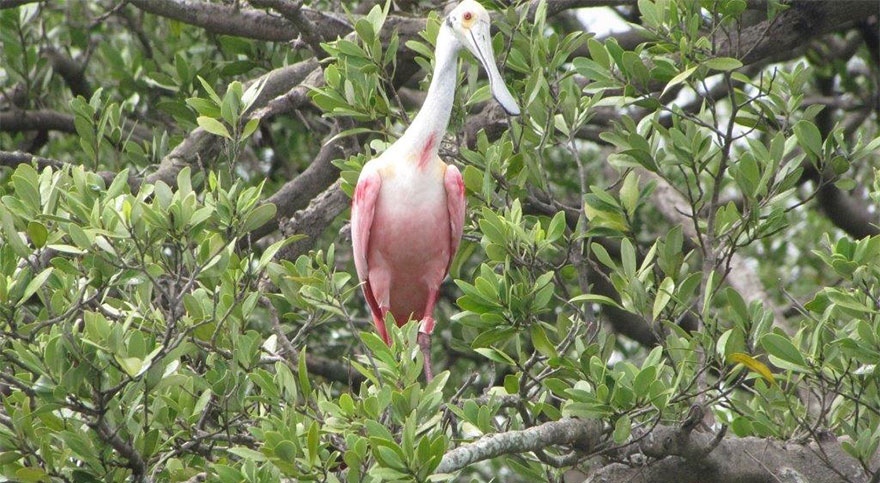Florida Audubon purchases Terra Ceia Bird Island

With state conservation land purchases still at a low level, the Florida Audubon Society has purchased one of the most important bird rookeries in the Tampa Bay area.
Terra Ceia Little Bird Island is only two acres large, but its dense mangrove forests provide nesting habitat for 14 important species, including the iconic roseate spoonbill.
“The island is an important addition to the Florida Audubon Sanctuaries, and will be managed by our professional staff with the assistance of our local chapters and volunteers,” said Audubon Florida Coastal Islands Sanctuaries manager Mark Rachal. “As many as 400 pairs of birds nest on it, making it one of the largest bird colonies in the area.”
Even without having budgeted funds for the purchase, Audubon moved immediately once the island became available, added Eric Draper, Audubon state director. To replace funds, Audubon is offering a once-in-a-lifetime opportunity to name a valuable bird nesting colony on a first-come, first-served basis, adds Ann Paul, regional coordinator for the sanctuaries program.
“The acquisition of this island is significant, because there are so few islands suitable for colonial waterbird nesting,” notes Randy Runnels, Florida Department of Environmental Protection’s Terra Ceia Aquatic Preserve manager. “While the remarkable recovery of roseate spoonbills in the Tampa Bay area is centered on the Alafia Banks, protecting spoonbill rookeries like this one in other parts of the bay literally avoids ‘putting all of the eggs in one basket.'”
A 2006-2007 survey of Terra Ceia Little Bird Key showed 65 spoonbill hatched, with banded birds showing up in Duval, Nassau, St. Johns, Pinellas, Hernando and as far south as Lee County.
ICAR to drive planning for coastal resiliency
A two-day workshop, hosted by the Initiative on Coastal Adaptation and Resilience (ICAR), USF St. Petersburg and the Tampa Bay Regional Planning Council ONE BAY Resilient Communities Working Group, will be held Sept. 22 and 23 at University of South Florida St. Petersburg University Student Center.
The goal is to create a series of facilitated discussions between experts from South Florida and the Tampa Bay region so that participants can explore lessons learned from other parts of the state and develop strategies that apply locally.
Goals include:
- Foster a dialog between local elected officials and academia on how to best address the regional impacts of climate change
- Link academic and scientific research to adaptation policy and implementation
- Identify research, data and policy gaps and needs to create a focused research plan
- Evaluate the need for a regional climate adaptation plan or compact-style agreement in Tampa Bay.
Learn more at usfsp.edu or onebay.org.
Pinellas County to get improved boating signs
The Florida Fish and Wildlife Conservation Commission has begun installing waterway markers for state-adopted boating safety zones around the bridges on the Intracoastal Waterway in western Pinellas County.
The FWC is installing new markers along with replacing signs to reflect a recent change in the state-adopted boating safety zone rule. The signage is separate from the manatee protection zones adopted by the FWC in June. Signs for those areas will be erected beginning next year with enforcement to begin after the new signs are installed.
Sea level rise: what’s our next move?
The Institute on Science for Global Policy, established by St. Petersburg native George Atkinson who also served as science and technology adviser to U.S. Secretaries of State Colin Powell and Condoleezza Rice, will host a conference on sea level rise in conjunction with the St. Petersburg College and the St. Petersburg/Pinellas Working Group on Oct. 2 and 3.
ISGP specializes in connecting international experts with local government and society leaders to increase understanding of the science and technology issues facing individual communities. The first day of the event allows participants to interact with leading international experts on climate change including:
- Harold Wanless, professor and chair, Department of Geological Sciences at the University of Miami
- Andrew Keeler, University of North Carolina Coastal Studies Institute and economics professor, Eastern Carolina University
- John Englander, author of “High Tide on Main Street: Rising Sea Level” and “The Coming Coastal Crisis,” and consultant on the financial risks of storms and sea level rise.
The second day will focus on bringing experts and citizens together in small-group caucuses to identify areas of consensus and actionable next steps specifically relevant to St. Petersburg and Pinellas County.
The conference is free and open to the public, but advance registration is required. Visit scienceforglobalpolicy.org to learn more.